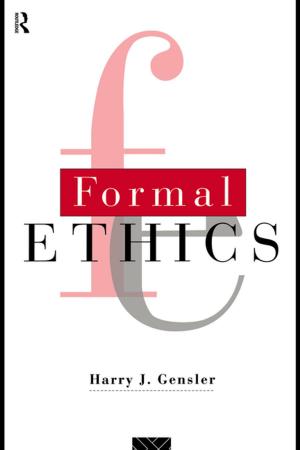The Subjection of Women
Nonfiction, Social & Cultural Studies, Political Science, Politics, History & Theory| Author: | ISBN: | 9781351302500 | |
| Publisher: | Taylor and Francis | Publication: | April 24, 2018 |
| Imprint: | Routledge | Language: | English |
| Author: | |
| ISBN: | 9781351302500 |
| Publisher: | Taylor and Francis |
| Publication: | April 24, 2018 |
| Imprint: | Routledge |
| Language: | English |
The Subjection of Women, which Mill wrote in 1861 but did not publish until 1869, is one of the seminal texts of feminism and aroused more antagonism than anything Mill ever wrote. Conservatives predicted it would do to the English family what socialism would do to England's economy. Liberals believed that women would vote conservative. Many prominent Englishwomen, such as Charlotte Brontë, Elizabeth Barrett Browning, Christina Rossetti, and George Eliot, opposed women's suffrage. Even such advanced thinkers as Sigmund Freud were hostile to the book.In The Subjection of Women Mill argues with lucidity, force and more than usual metaphorical eloquence that "the principle which regulates the existing social relations between the two sexes-the legal subordination of one sex to the other-is wrong in itself, and now one of the chief hindrances to human improvement; and that it ought to be replaced by a principle of perfect equality..." Mill does battle on two fronts, that of intrinsic justice and that of utility. He sees the subjection of women as not only inherently wrong, but intertwined with all the evils of existing society. In support of his central principle, Mill argues that there is no basis in nature for the inferior status of women. He likens the position of the Victorian wife to that of a domestic slave and discourses on the debasing nature of all master-slave relations. He provides historical evidence of what women are capable of achieving and he speculates upon the benefits that will accrue to society as well as individuals from female emancipation, most especially from equality in marriage, which Mill describes as the only remaining legal form of slavery.This new critical edition shows that Mill's classic work has lost none of its relevance. The cross-disciplinary approach of the book can be useful in literature, history, or sociology courses as well as womens studies.
The Subjection of Women, which Mill wrote in 1861 but did not publish until 1869, is one of the seminal texts of feminism and aroused more antagonism than anything Mill ever wrote. Conservatives predicted it would do to the English family what socialism would do to England's economy. Liberals believed that women would vote conservative. Many prominent Englishwomen, such as Charlotte Brontë, Elizabeth Barrett Browning, Christina Rossetti, and George Eliot, opposed women's suffrage. Even such advanced thinkers as Sigmund Freud were hostile to the book.In The Subjection of Women Mill argues with lucidity, force and more than usual metaphorical eloquence that "the principle which regulates the existing social relations between the two sexes-the legal subordination of one sex to the other-is wrong in itself, and now one of the chief hindrances to human improvement; and that it ought to be replaced by a principle of perfect equality..." Mill does battle on two fronts, that of intrinsic justice and that of utility. He sees the subjection of women as not only inherently wrong, but intertwined with all the evils of existing society. In support of his central principle, Mill argues that there is no basis in nature for the inferior status of women. He likens the position of the Victorian wife to that of a domestic slave and discourses on the debasing nature of all master-slave relations. He provides historical evidence of what women are capable of achieving and he speculates upon the benefits that will accrue to society as well as individuals from female emancipation, most especially from equality in marriage, which Mill describes as the only remaining legal form of slavery.This new critical edition shows that Mill's classic work has lost none of its relevance. The cross-disciplinary approach of the book can be useful in literature, history, or sociology courses as well as womens studies.















